- Home
- William Massa
Silicon Man Page 3
Silicon Man Read online
Page 3
“The network calls runaways ‘packets,’ guides are known as ‘routers,’ safe houses are ‘hubs’ and ‘portals.’ Their model is the Underground Railroad that smuggled slaves from the South to the North in the 19th Century.”
Feeling the blank looks, Cole decided to elaborate. “White sympathizers teamed with free African-Americans to operate a secret network helping blacks escape a life of slavery in the South. In those days, railroad terminology was used as code words for safe houses and escape routes. The Underground Network updated the concept for the computer age and tailored their secret terminology accordingly.”
Cole let the room digest what he had just shared before he continued. “In short, the mechs’ human collaborators see themselves as enlightened liberators on the forefront of a new civil rights movement.”
It would be preaching to the choir to say so, but Cole knew the collaborators were misguided. Mechs weren’t members of another race or species. They were machines built by man to serve mankind, as Janson had so aptly put it. Their psychology shared nothing with humanity, which had struggled through thousands of years of evolution to reach its current level of civilization. Their so-called emotions were as fake as the pre-fabricated memories that newly activated models came equipped with. Humans had a tendency to anthropomorphize animals and objects. Mechs merely took this idea to the next level. In Cole’s eyes, they weren’t a disenfranchised population deserving of equal rights; they were at best a necessary evil and potentially a terrible threat to the future of humanity.
“Can you back up any of these claims?” The female executive asked pointedly.
“We're working on it.“
“The runaways you've captured—”
“Made use of a sophisticated self-destruct program. They would rather fry their memory than allow us to poke around in their files.”
“So you haven't been able to analyze their data?”
“Correct.“
“In other words, you expect us to recall the X-3000 line without a shred of hard evidence.”
“Lady, I'm just doing my job.”
“Your job is to catch runaway mechs, not tell us how to do ours.” Her voice grew icy as she continued. “Synthetika won't mothball 20 million units because of a glitch.”
Cole could feel his anger rising. “This isn't a glitch...”
Janson had been following the exchange in noncommittal silence but the time had come for him to join the fray. “I think you made your point, commander—“
Cole wasn’t done yet. He was just getting started. “These machines are going against their programming! Today they're smuggling runaways out of the country. Who knows what they'll do tomorrow?”
“That's enough!” Janson interjected sharply.
Cole could see the other executives flinch at the sound of their CEO’s raised voice. Janson prided himself in his ability to keep his cool. He might offer an underling a warm smile and reassuring nod at the end of a conversation, only for a pink slip to appear in their inbox the next day, an indicator that boundaries were overstepped and the wrong comment uttered. For Janson to visibly show anger was almost unheard of.
“Thank you, commander, but you can go now.” The way the words were spoken, he might as well have said, ”You’re fired!”
Cole’s mouth was set in a hard line as he glared at Shelly or whatever her name was. He was barely able to contain his fury. He decided he’d better leave the conference room before he got himself into deeper trouble. The time had come to back off and make his exit.
Cole never noticed how Janson's hawk-like gaze followed him as he stepped out of the conference room. If he had turned around, he would have realized Synthetika's CEO looked satisfied as his lips bent into a thin smile, almost as if Cole had passed some sort of test.
CHAPTER THREE
THE BUSTLING WATERING hole was filled with the sounds of raucous abandon. It was a blue-collar joint and everyone gathered here today was looking to knock back a few beers and blow off some steam. There was nothing trendy about this dive and it boasted a rough physicality that was becoming increasingly rare in a techno-centric world, Cole thought. The jukebox blared classic rock, drowning out the clacking of pool balls. The smell of bacon and grease wafted through the air.
Cole was nursing a beer, but the alcohol hadn’t improved his mood. While he had traded in his AI-TAC combat gear for civilian attire, he was still wearing his armor. His expression remained guarded. His squad-mates had decided to grab a few drinks and he had foolishly accepted the invitation. But as soon as Cole finished his first beer, he knew it was a mistake. Instead of easing his tension, the alcohol was adding fuel to the fire and flaring his anger. The incident on the freighter and the subsequent board meeting had gotten to him and alcohol wouldn’t fix the problem, not even in the short term.
Facing him directly was Margo. She rolled her eyes incredulously. “You actually suggested they recall the whole line? I bet that went over well.”
Cole answered by draining a third of his bottle in a single swig. Another one of his men whose name was Ruger, 6’5 and 250 pounds of solid muscle, chimed in. His brutish features belied a sharp mind — AI-TAC didn’t accept dummies into its elite ranks. “Quick newsflash, Cole,” he said, ”The average American is 52 years old and has 0.5 children. This country needs AIs.”
“But do they need us?” Cole countered.
“Here we go...” Margo’s tone suggested that she knew all too well where the conversation was headed.
Cole knew it too. He was falling into an old pattern. His team had heard what he was about to say a hundred times before, but the alcohol had loosened his tongue. “They're faster. Stronger. Smarter. And they're starting to catch on. It's called evolution.”
“Come on now–“ Ruger’s meek protest couldn’t slow Cole down. The floodgates were open. There were forces at work inside Cole that made him steer clear of alcohol. Today, he had lowered his guard and was paying the price. Booze had a nasty way of driving his demons to the surface. Another person seemed to be in charge as he spoke. “We want mechs to be more lifelike, so we develop organic bio-shells. We want them to laugh at our lame jokes, so we up their emotional reactivity. But where does it end?”
“Synthetika just gives the public what they demand,” Margo said.
“And their greed feeds this demand without giving a shit about the consequences. We deserve what’s coming.”
Cole was surprised by his own harsh tone of voice. He hadn’t always thought this way. There was a time when things were… different. When he was different.
Margo finished her beer, took a deep breath and made a valiant attempt at rescuing the evening. From the fatalistic look on her face, it was clear she knew her efforts were doomed to fail. “Mechs will malfunction, Cole. Doesn't mean the machines are taking over.“
In response to her words, Cole's gaze traveled the length of the bar and came to rest on a mech go-go dancer. She was flaunting her perfect physique on an elevated platform. Feeling Cole’s attention, the android misread his interest and flashed him a seductive come-hither smile but her invitation was met with an iron expression and she was forced to look away. She might be an older model (Cole doubted the dive could afford a top-of-the-line X-3000) but she must be running facial-recognition software equipped with the latest emotion-reading upgrades.
Ruger witnessed the exchange and flashed Cole a grin. He was a more recent addition to the team, a transfer from vice who still didn’t quite get that the commander had no sense of humor when it came to mechanicals. “I think she likes you. You know what they say: once you go mech, you'll never go beeeck.”
Cole wasn't amused. He drained his beer and dropped some cash on the table. Time to call it a night. “Ladies and gents, you have a great evening.”
As Cole disappeared through the bar’s exit, he could hear Ruger address Margo.
“He never turns it off, does he?”
“He's not the type.“
Cole saw Margo
get up and go after him but he didn’t slow down. He emerged from the bar and was greeted by a blast of cold night air. He welcomed the sharp pinpricks as the wind knocked some effects of the alcohol out of his system. He could almost feel his thoughts clearing as the music from the bar began to fade behind him.
It didn’t take long for Margo to catch up with him. “Listen Cole, he's just running off his mouth,” she said. “Ruger didn't mean nothing.”
“It's all right. It's a free country.”
A look of concern flashed over Margo’s features. “You seem a little shaky — let me give you a lift.”
“Thanks, but I'll walk.”
“How about I join you? I wouldn’t mind some fresh air.”
The words held an unvoiced promise. A part of Cole wanted to say yes, wanted her to walk him home and spend the night, but the wounds of his past were still too raw to let anyone into his life. Besides, it would change everything at work. Sleeping with an officer under his command was a surefire recipe for disaster. “I'll be all right,” he said, already regretting the words. “I know my way home.”
Cole saw the flicker of disappointment on Margo’s face. Before he could change his mind, he turned away and left her warmth behind him. For the next half hour, he drunkenly trundled through the city streets. No one walked in Los Angeles. It was just him, his thoughts and the occasional car zipping past him, occupants reading or texting away while the computers in their vehicles took care of the driving, or a mech did.
He had almost reached his tiny apartment, a small one-bedroom near Mar Vista, when his alcohol-clouded gaze fell on a giant 3-D digital billboard. It was mounted on the roof of a commercial building at an intersection. An obvious eyesore for the neighborhood, and its flashing lights probably kept residents up at night. It was playing a Synthetika commercial for the new X3000.
The ads were everywhere, a pervasive, constant assault on the senses. Sometimes Cole felt the bots weren’t a product being marketed but part of some state sponsored propaganda campaign. This latest ad was a variation of the holo-file that had played during the Synthetika briefing, and thus it brought back his memories of the day in full force. On the screen, AIs performed everyday tasks with greater efficiency and enthusiasm than a human could ever muster. The tagline flashed below the images. EXPERIENCE THE DIFFERENCE.
The text suddenly fizzled and the letters shimmered and changed: "AI" turned into "I AM."
Cole froze. His eyes combed the rooftop and spotted a moving silhouette underneath the billboard. A digital graffiti artist, this tagger had hacker skills. A wafer-thin tablet computer was hooked into the digital billboard’s control panel.
“Hey you, stop where you are!” Cole shouted and the tagger reacted immediately. He unplugged his laptop and took off into the night. Cole made a dash for the building’s fire escape. He didn’t know how he expected to climb three flights of stairs in his current state, but he was going to give it a go.
Cole tried to leap and pull himself up on the first ladder, but he failed to get a good grip on the rail and fell back to the ground. His fall was cushioned by a collection of garbage bags redolent with the stench of rotting meat and fruit. He felt the contents of his stomach crawling up his throat and furiously sucked in a breath of air, fighting back the nausea.
The kid must have retreated to the neighboring rooftops and in Cole’s condition he couldn’t overcome the vandal’s head start. Frustrated, Cole kicked a nearby garbage can. Trash spilled into the alley and rats scurried off into the shadows.
Cole didn’t remember how he got home, didn’t remember stumbling into his lonely apartment. That night he dreamed of the incident on the freighter.
We think… therefore we are.
In the dream, Cole was hunting the runaway mech. Once again, he pumped a round into the android’s chest.
Once again, the woman went down in a shower of sparks, and once again, she looked up at him, haunted expression imploring but there was one crucial difference this time around.
In Cole’s dream, the woman looking up at him had the face of his dead wife.
CHAPTER FOUR
A GROUP OF people from all walks of life — men, women, old and young — were making their way down a city street when a German Shepherd cut them off. The dog looked dangerous, teeth bared, powerful muscles coiled in preparation for an attack.
The animal wasn’t interested in most of the civilians; his full attention was focused on a frail old lady nearly obscured in the back of the crowd. The dog wove between the various pedestrians and zeroed in on her. Face to face with his quarry, the dog began a furious, incessant barking. The old lady stopped dead in her tracks, feet rooted, becoming a statue. The crowd dispersed, but the dog paid them no mind. The animal's universe had been reduced to the person he’d targeted.
Someone joined the dog and uttered a sharp command. “Lass es,” German for “leave it.” The dog stopped barking but his gaze never left the woman. He had been trained to identify the enemy from a distance, without direct engagement. Attacking this particular woman would result in a mangled, broken canine. Cole snatched the dog by the collar, calming him with an affectionate bear hug. He whispered reassuring words into the German Shepherd’s ear and fed him a biscuit, reward for a job well done.
Cole turned to the AI-TAC cadets observing the scene with great interest. He taught a weekly class at the AI-TAC training facility. The city block was a mock-up used for a variety of urban engagement exercises. The civilians were members of AI-TAC who had volunteered to stretch their acting muscles for a couple of hours, at full pay. Most welcomed the break in their routines and jumped at the chance to introduce the next generation to the hard facts of their chosen profession.
The competition was tough to earn a slot in the unit. Out of a class of 20 students, only two would make the cut and be allowed to join the team on a permanent basis. These cadets were still in their first week of orientation. The rough stuff would kick in soon enough. They would be pitted against AIs programmed to attack them and make their life a living hell. The bots wouldn’t pull any punches during those exercises. Machines training humans to fight machines. It was a crazy world they lived in, Cole mused.
The cadets followed Cole's every move, fascinated with the seasoned veteran. The commander had a bit of a rep in the unit and from their awed expressions, it was apparent that word of his exploits had gotten around.
Cole addressed the class. “How to spot a mech? Especially runaways who have modified their appearance to pass themselves off as humans?” Cole pointed at the canine. “First rule — don't put your trust in bio-sensors. Machines can outsmart other machines.“ Cole fed the dog another biscuit. He enthusiastically wolfed it down. “Nothing can deceive a German Shepherd's keen sense of smell. A dog knows the difference between man and mech.”
Cole shifted his attention to the old lady outed as a synthetic. “Only a fool will engage an AI in hand-to-hand combat. But sometimes you won’t have a choice.”
Cole had been one of those fools. He had faced rogue AIs unarmed on a couple of occasions, 200 pounds of flesh and blood versus a ton of titanium designed to break every bone in his body. He walked away from both fights victorious. These were David vs. Goliath matches in the truest sense. Machines were faster, stronger and impervious to pain. The deck was stacked against any human opponent, but machines had vulnerabilities that could be exploited.
Teaching cadets his tricks was part of Cole’s job. But knowing what to do and being able to do it in the field were two different things. Time would tell who could keep their cool with a steel monster bearing down on them.
Cole nodded at the elderly lady, who was neither elderly nor a lady. “Attack me,” he ordered. The previously prone android sprung to life, reacting without hesitation. A fist shot out at Cole but, instead of blocking the blow, Cole grabbed the mech's arm and used his attacker's momentum to send the mech flying to the floor.
“Never directly oppose the power of a machine. Steel
conquers flesh. Redirect its force. Blend with the motion of your assailant. These are principles of Aikido.”
“You mean "AI-Kido,“ one of the cadets quipped, to guffaws from the class. The kid was being a smartass. Cole liked him immediately. He allowed himself a grin that vanished the moment he spotted a new arrival in the training facility. It was none other than Janson. Cole had no idea what would make the CEO interrupt a training session, but he had a feeling it wasn’t good news.
“All right guys, that's enough for today. Class dismissed.”
Janson approached Cole as the cadets filed out. “Some fancy moves there.” The man’s voice was neutral, friendly even. What was going on here?
Cole’s guard was up immediately. “To what do I owe the honor?” He wasn’t going to beat around the bush and play games. If they were about to kick him out of the unit, they could spare him the formalities and just get on with it. Janson eyed him as if he knew what Cole was thinking. He probably did. The man was as shrewd as they come, able to read people like an open book. It took excellent people skills to run a company that built machines.
“Ten months ago, you were just another cop who requested a transfer to AI-TAC,” Janson said. “Today, you're our most decorated officer. Yet, as you demonstrated yesterday, you don't care much about politics...”
“I care about keeping this city safe from runaways.”
“Good. That makes two of us.”
The conversation wasn’t playing out the way Cole had expected. He scrutinized Janson, trying to get a feel for where the CEO was coming from. It almost sounded like the executive was trying to bond with him. Janson decided to end the suspense and come out with the reason for his visit. “What would you say if I told you I've been conducting my own investigation into the Underground Network?”
For a moment, Cole thought he misheard the man. He searched Janson‘s face and what he saw there made him realize he’d been played for a fool. “If you know about the network, why pull off that little show the other day?”

 Sacrifice of the Sorcerer
Sacrifice of the Sorcerer Game of the Wolf
Game of the Wolf The Paranormalist 3: Curse of the Abyss
The Paranormalist 3: Curse of the Abyss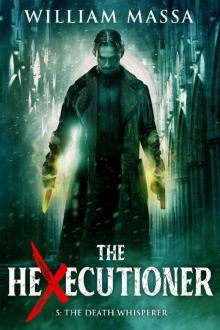 The Death Whisperer
The Death Whisperer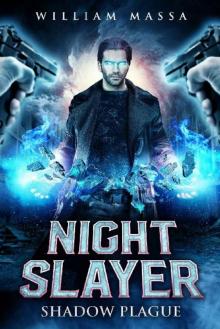 Shadow Plague
Shadow Plague The Devil's Apprentice
The Devil's Apprentice Night Slayer: Midnight War
Night Slayer: Midnight War The Possessed (The Paranormalist Book 5)
The Possessed (The Paranormalist Book 5) The Paranormalist 4: The Unearthly
The Paranormalist 4: The Unearthly Occult Assassin: The Complete Series (Books 1-6)
Occult Assassin: The Complete Series (Books 1-6) Soul Taker
Soul Taker The Paranormalist- Servants of the Endless Night
The Paranormalist- Servants of the Endless Night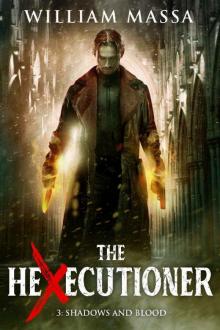 Shadows and Blood
Shadows and Blood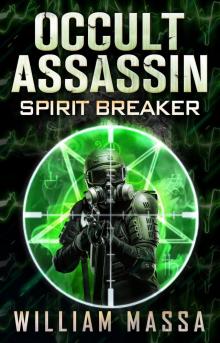 Spirit Breaker
Spirit Breaker Panther Curse
Panther Curse Night Slayer 2: Monster Quest
Night Slayer 2: Monster Quest Shadow Detective Supernatural Dark Urban Fantasy Series: Books 4-6 (Shadow Detective Boxset Book 2)
Shadow Detective Supernatural Dark Urban Fantasy Series: Books 4-6 (Shadow Detective Boxset Book 2) Shadow Detective Supernatural Action Thriller Series: Books 1-3 (Shadow Detective Boxset)
Shadow Detective Supernatural Action Thriller Series: Books 1-3 (Shadow Detective Boxset) Occult Assassin: Ice Shadows (A Novella)
Occult Assassin: Ice Shadows (A Novella) Skull Master
Skull Master Crossing the Darkness
Crossing the Darkness Witch Wars (Shadow Detective Book 7)
Witch Wars (Shadow Detective Book 7) Apocalypse Soldier
Apocalypse Soldier Shadow Detective Supernatural Dark Urban Fantasy Series: Books 1-3 (Shadow Detective Boxset)
Shadow Detective Supernatural Dark Urban Fantasy Series: Books 1-3 (Shadow Detective Boxset) Blood Rain (Shadow Detective Book 3)
Blood Rain (Shadow Detective Book 3)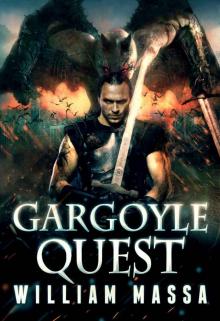 Gargoyle Quest
Gargoyle Quest Fear the Light
Fear the Light Ghoul Night
Ghoul Night Hell Breaker (Shadow Detective Book 9)
Hell Breaker (Shadow Detective Book 9) Ghoul Night (Shadow Detective Book 6)
Ghoul Night (Shadow Detective Book 6) Skull Master (Shadow Detective Book 5)
Skull Master (Shadow Detective Book 5) Occult Assassin: Damnation Code (Book 1)
Occult Assassin: Damnation Code (Book 1) Demon Dawn (Shadow Detective Book 4)
Demon Dawn (Shadow Detective Book 4) Occult Assassin: Ice God
Occult Assassin: Ice God Shadow Detective Supernatural Dark Urban Fantasy Series: Books 7-9 (Shadow Detective Boxset Book 3)
Shadow Detective Supernatural Dark Urban Fantasy Series: Books 7-9 (Shadow Detective Boxset Book 3) Crimson Circle
Crimson Circle Coffin Collector
Coffin Collector Hell Breaker
Hell Breaker